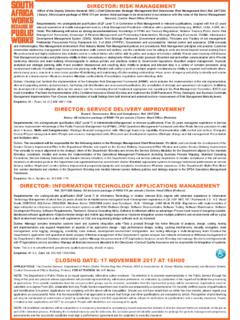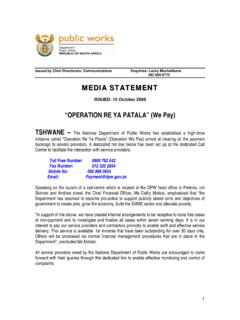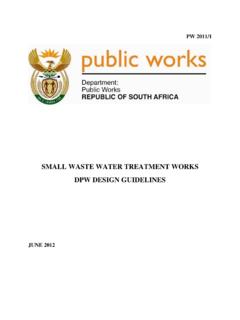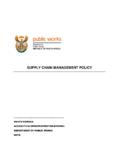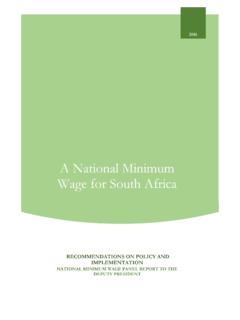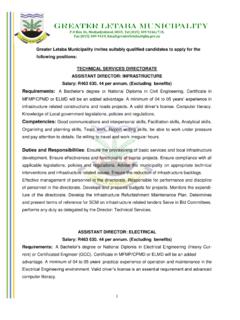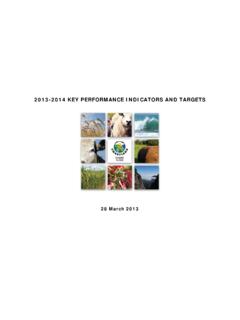Transcription of FINAL single pages - Department of Public Works
1 The challenge of restoring the skills pipelinea discussion documentskills for infrastructure delivery in south africapublic worksDepartment: Public WorksREPUBLIC OF SOUTH AFRICAISBN: 0-621-37105-XCopyright CIDB 2007 The South African construction industry is just coming out of a significant phase of decline that has seen limited investment in human capital development and the migration of available skills, leading to shortages of skills in the industry. The announcement of a large government infrastructure spending programme in 2005, such as the construction of the Gautrain Rapid Rail Link and provision of infrastructure for the 2010 Fifa Soccer World Cup, have highlighted the skills shortages, and necessitated timely interventions to ensure the delivery of a number of infrastructure development projects. In response to this need, the cib, in conjunction with the National Department of Public Works , commissioned a project to quantify the skills currently available in the construction industry, estimate the anticipated skills required to meet this ambitious investment programme and lastly, estimate the shortfall and identify interventions for addressing the skills problem.
2 This skills report is intended to portray the state of skills in the industry, identify the skills provisioning challenges and mobilise the industry to contribute to skills development. Many organisations, government departments, state- owned enterprises and private sector clients contributed to, and helped steer the report firstly quantifies the skills categories and numbers required to meet the projected infrastructure investment. It concludes that there will be a shortage of high level skills that require long periods of time to develop to the requisite competence levels, but can be sourced on the international market. It further paints a picture of an industry lacking in intermediate artisan skills that can be developed rapidly given significant investments and workplace exposure. The traditional pathways used for the development of artisan and engineering skills in South Africa are then described, and the report concludes that there has been a significant breakdown in the skills development pipeline.
3 It provides for short-term interventions to meet the current challenge and medium- to long-term solutions to re-establish the skills report lastly makes recommendations on the establishment of sustainable pathways to facilitate the development of a pool of construction expertise, and identifies the key role-players responsible for taking these forward. The cib, in partnership with key stakeholders, is facilitating that the recommendations are taken is hoped that this report will make a significant and positive contribution to the body of knowledge and debate on the skills supply in the built environment in South AT Didiza, MPMinister of Public WorksPretoria, South AfricaApril and skills challenge: a skills-supply organisations, government departments, state-owned enterprises and private-sector clients contributed to, and helped steer, the investigation.
4 The support of these organisations is gratefully acknowledged. They included: National Department of Public Works Department of Public Enterprises Construction Education and Training Authority Department of Labour Department of Public Service and Administration Department of Education Local Government and Welfare SETA South African Institute of Consulting Engineers South African Federation of Civil Engineering Contractors Master Builders Association of South Africa Industrial Development Corporation South African Institute of Steel Construction National Business Initiative ESKOM TRANSNET SASOL Project Owner's ForumThe project team for this investigation comprised:Carmel Marockcib BoardAndrew Merrifieldcib Associate Bobby SoobrayanConsultant Laura MsemeThabiso Consulting Diggy MsemeThabiso Consulting Joanne MillianThabiso Consulting Ntebo NgozwanacibRodney MilfordcibSihle Dlungwanacibddddd.
5 Pg 1 ..pg 2 ..pg 10acknowledgements1. background and introduction1skills for infrastructure delivery in south africa: the challenge of restoring the skills pipelineThe cib recently undertook an investigation into skills for infrastructure delivery in order to contribute to the industry-wide debate as to whether there is likely to be a skills deficit in the construction and engineering fields as a result of the proposed increases in infrastructure investment over the next decade. In order to investigate the potential skills deficit, the cib commissioned two studies, namely: Demand for skills - an analysis of the proposed infrastructure spending programme, undertaken by Andrew Merrifield1(July 2006); and Current and potential skills in the infrastructure sector, undertaken by Thabiso Consulting (July 2006).
6 In addition, the cib interacted extensively with a range of stakeholders and other initiatives, including the Joint Initiative on Priority Skills Acquisition (Jipsa).An overwhelming conclusion of this investigation is that a comprehensive challenge exists to restore or replace the skills pipeline that produces the wide range of skills required by the construction and engineering industries, in order that the country's longer-term infrastructure delivery objectives can be discussion document provides a synthesis of the cib's investigation, namely: a summary of skills demand and supply; a summary of the key short- and medium-term skills challenges facing infrastructure delivery in South Africa; a summary of the challenges to the skills supply pipeline; and recommendations on a way ..as many as 90% of South Africa's consulting engineering firms are trying to employ skilled engineers, technologists and technicians but finding it hard to identify prospective candidates.
7 The Civil Engineering Contractor Bulletin16 October 20061 This document is available from the cib, the skills challenge: a summary2skills for infrastructure delivery in south africa: the challenge of restoring the skills Demand and SupplyFormal employment in the construction sector decreased progressively in the 1990s until the low of 2001 when the industry had lost more than 200 000 jobs. An increase in infrastructure investment since 2003 has seen a steady increase in the number of jobs created and the accompanying challenge to secure requisite skills. This challenge has been exacerbated in recent times by the announcement of the Gautrain, infrastructure for the 2010 FIFA World Cup and government's R372bn infrastructure investment programme. The strong focus of the EPWP on labour intensive construction also places extra demands for qualified supervisors and managers.
8 Historically, as evidenced by graduation rates in construction and engineering, skills development has always lagged behind increases in construction spend. While it is reasonable therefore to assume that industry will respond to meet the growth in skills demand, this current growth phase requires substantive interventions involving a wide range of stakeholders, because: the current growth in infrastructure investment has come on the back of lows in the industry that have not been experienced for decades; labour practices of the past decade have resulted in fundamental structural changes favouring labour brokering, resulting in declining investments in skills development; and there have been fundamental changes, and breakdowns, in the skills-supply a demand perspective, the cib first investigated the likely level of infrastructure 2investment, from which it concluded that the growth in infrastructure investments is likely to be around 10% to 15% per annum over the next five years.
9 The investigation then assessed the skills requirements of different project types, including building, minerals processing, bulk earthworks, roads and stormwater, and water dRebar handsCase study: Non-residential buildingSkills categoryAdditional skills requirementsExperience requirementsContracts directors6010 to 20 yearsContracts managers1202 to 5 yearsSite agents2302 to 5 yearsSite engineers7002 to 5 yearsForemen2302 to 3 yearsJunior foremen3502 to 3 yearsShutter hands1 2003 to 12 months1 2003 to 12 months2 Demand for skills - an analysis of the proposed infrastructure spending programme, undertaken by Andrew Merrifield (July 2006)Boom promise may fade on lack of skillsEskom chief economist Mandla Maleka says government has to provide an environment for a bigger pool of skills even if it is regulatory , to plug the gap. The skills shortage is considered so serious it could sabotage the Accelerated and Shared Growth for SA initiative.
10 Deputy President Phumzile Mlambo-Ngcuka, who is driving the initiative, has alluded to this: government's R372m infrastructure investment between now and 2009 is expected to stretch the country's skills pool to the limit. Business Day13 June 20063skills for infrastructure delivery in south africa: the challenge of restoring the skills pipelineand sanitation. It applied these profiles to understand the skills demands in the building and civil engineering sectors and indicated that, if demand in these sectors were to reach a projected 10% growth rate over a five-year period, the following demand for skills was obtained: for key management, supervisory and engineering personnel: less than two hundred in most categories over a five-year period; whilst for key artisans; between two to three thousand in the most populous categories over a five-year analysis of the supply of skills in the learnership, further education and training (FET) and higher education and training (HET) 3sectors shows that increasing numbers of learners are entering training institutions - which could suggest that the supply should more than adequately cover the increased demand over the next five years.
